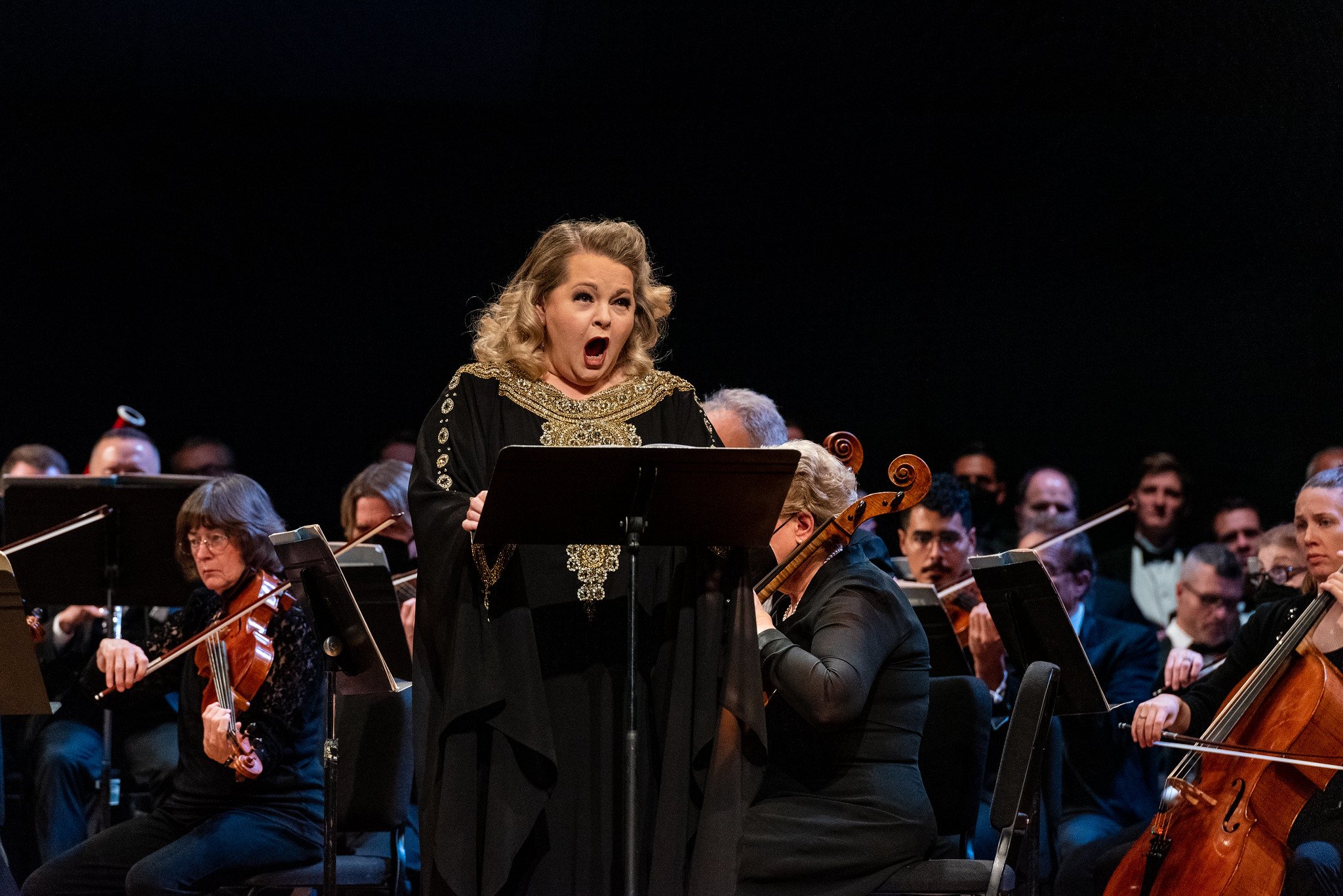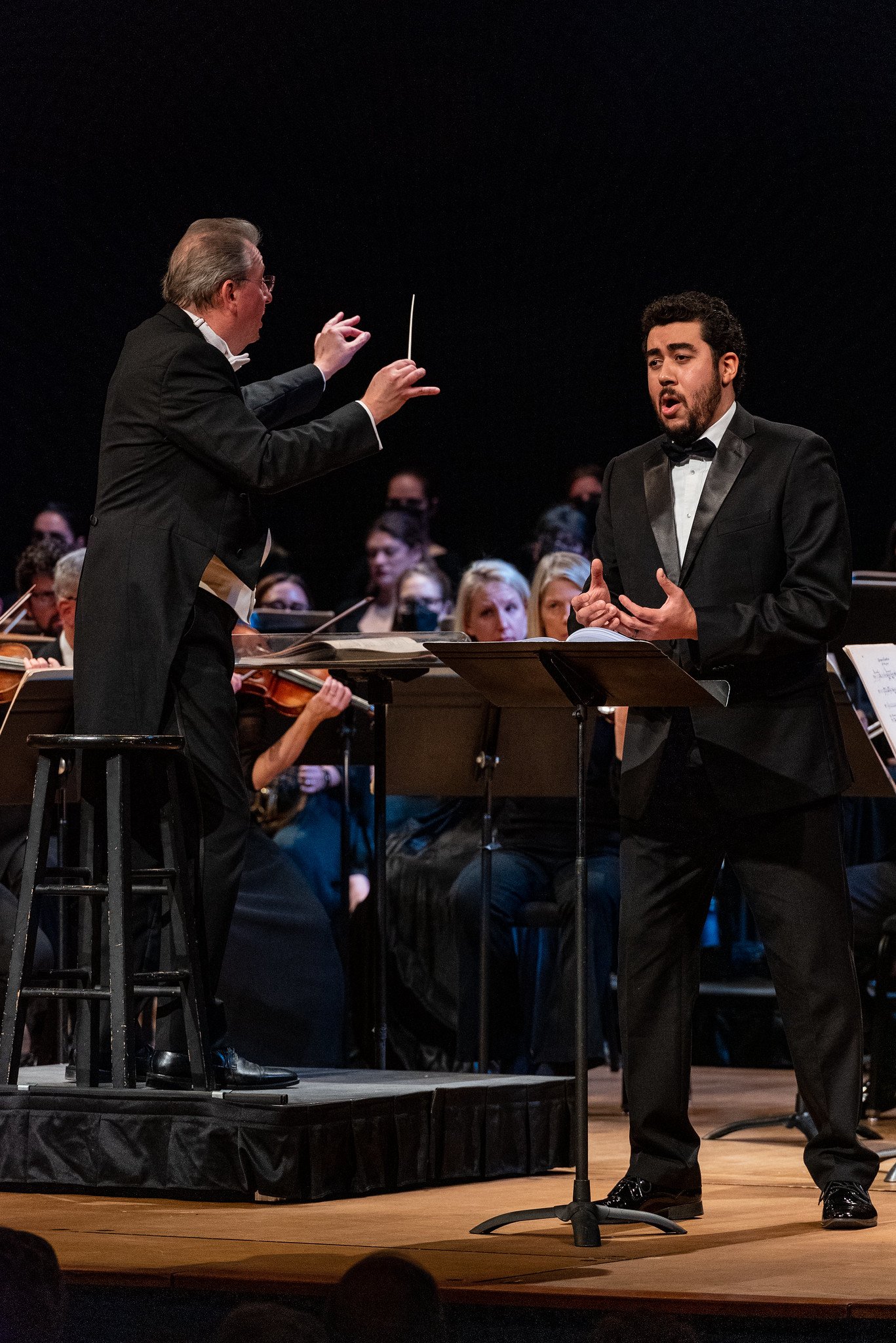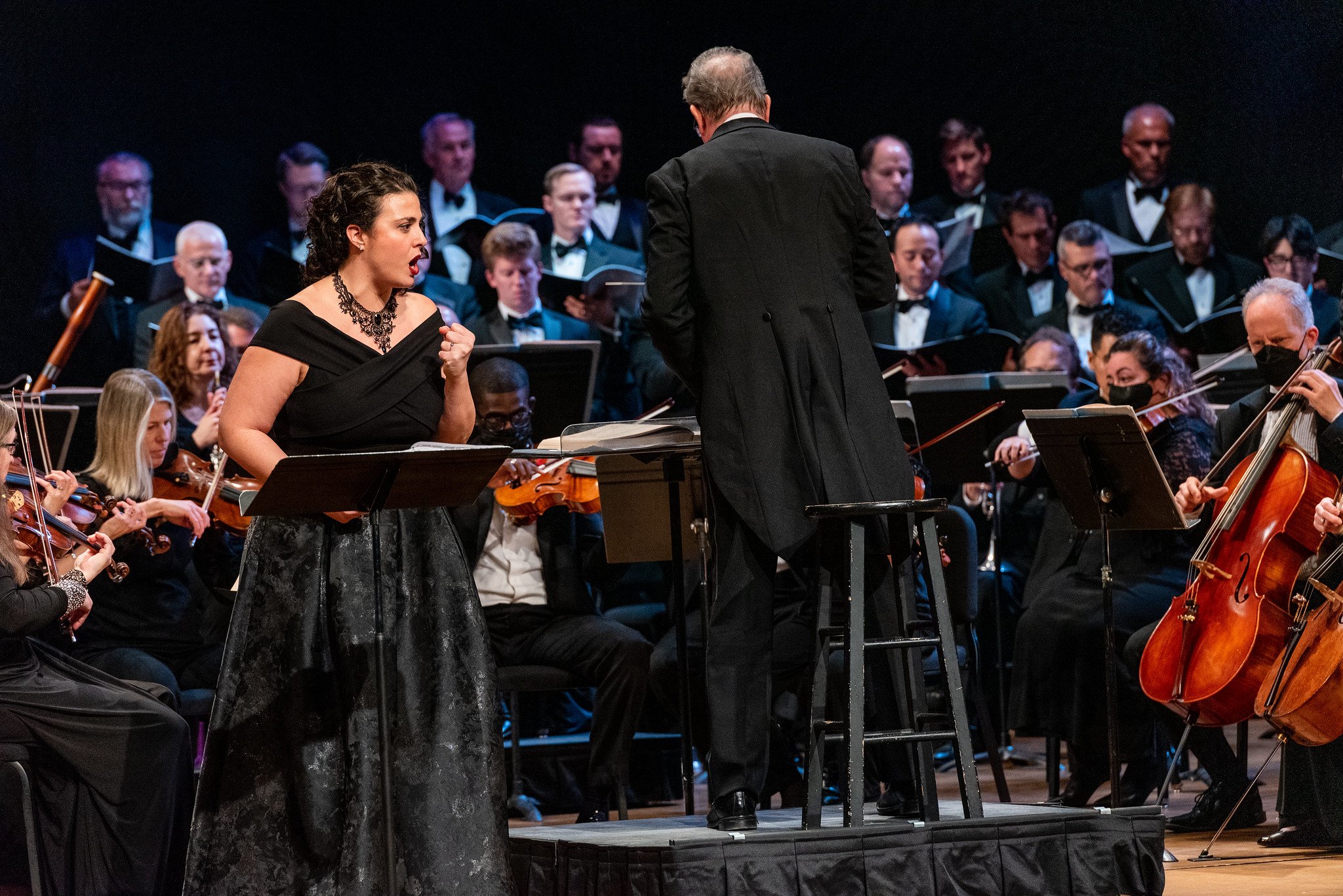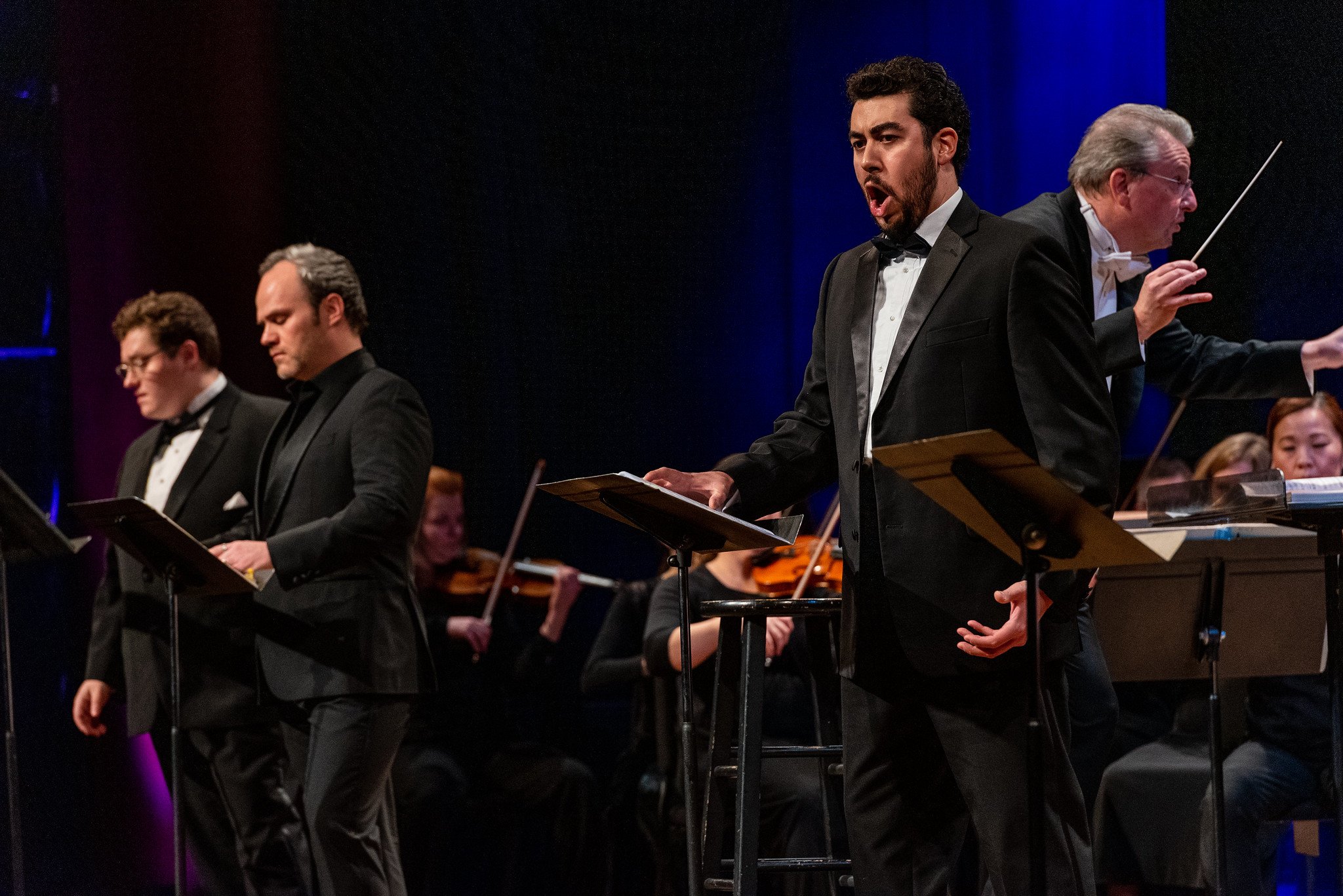Washington Concert Opera’s first production of the year follows their usual recipe but bear in mind that it is a gourmet recipe: a classic opera chosen by WCO Artistic Director and Conductor Antony Walker, that you are not likely to hear in other venues in the DC area, performed in concert with a full orchestra and chorus on stage, sung by a world class array of opera singers, giving some of their best performances. Some of my favorite opera performances have been by WCO. Each production is reliably more than satisfying, and thus, similarly delicious was Roberto Devereux.
Singers Daniel O’Hearn as Lord Cecil and Roberta Mantegna as Elizabetta with full orchestra and chorus on stage behind them. Photo by Caitlin Oldham; courtesy of Washington Concert Opera.
Composer Gaetano Donizetti (1797-1848) who composed over sixty operas had a major influence on Italian opera; he was one of three developers of bel canto opera, along with Giacomo Rossini and Vincenzo Bellini. He led a highly successful but tragic life. His opera Roberto Devereux (1838) was composed during the period surrounding his 29-year-old wife’s death in 1837; none of their three children had survived more than a few days. Although he also composed successful comedies such as L’elisir d’amore, it is no wonder he is known for the strong infusion of drama in his tragedies. He composed three operas involving Tudor queens, Anna Bolena (1830), Maria Stuarda (1834), as well as Devereux; the first made him a star Italian opera composer. The librettist for Devereux was Salvatore Cammarano; he worked with Donizetti on five other operas, including their most famous opera, Lucia di Lammermoor, and he also worked with several other renown Italian composers, including Giuseppe Verdi.
Roberta Mantegna as Elizabetta, Conductor Antony Walker, and Andrew Owens as Roberto Devereux. Photo by Caitlin Oldham; courtesy of Washington Concert Opera.
One of my favorite aphorisms is “History is based on a true story”. In opera, plots dealing with real life characters are typically loosely based on history, but that’s what makes it fun. Let’s consider the plot of Roberto Devereux: Devereux, the Earl of Essex, returns to court from battle; he has made enemies. Before leaving for battle, he had become a strong love interest and favorite of Elizabetta (Queen Elizabeth I). Devereux also had fallen in love with Sara, a friend and confidante of the Queen. While he was away, the Queen married Sara off, over her objections, to the Duke of Nottingham, who could provide for her support; the Duke was a good friend of Roberto. You see the problem here? It’s not a good idea to prefer another love to the Queen, nor to be that rival. However, in fairness to Elizabetta, she did feel bad about having the Earl beheaded, so bad in fact she abdicated the throne to her cousin James VI. And, in fairness to the composer and librettist, they created quite a powerful drama, though with some serious modifications to actual history.
left photo: Elizabeth DeShong as Sara. right photo: Conductor Antony Walker and Ricardo José Rivera as the Duke of Nottingham. Photos by Caitlin Oldham; courtesy of Washington Concert Opera.
Setting the record straighter: Roberto Devereux was a real Earl of Essex, and Elizabeth I, of course, was a real Queen of England. The real Earl was a rogue and highly self-centered according to reports. They did have an interesting relationship; for some reason she favored the Earl, son of Ann Boleyn for most of his life, indulging him much more than other subjects committing offenses. Elizabetta had come to be known as the “Virgin Queen”, casting doubt on whether their relationship was passionate, though some historians suspect her purity was overly reported. In real life, the Duke was actually an Earl who had no special relationship with the Devereux; furthermore, the Duchess’s name was Catherine, and she did not have a love relationship with Devereux. It is true that the Queen had Roberto beheaded, but the reason was the unsuccessful insurrection he led against the crown. Finally, something that must really be corrected is that Queen Elizabeth I stopped being queen because of her death, not an abdication.
The true story is interesting, but Donizetti’s/Cammarano’s version with a love triangle is even juicier and a setting richer for possibilities for opera. They also added some suspense by having Devereux give Sara a ring that will save him if given to the Queen, but the Duke, now angry with his former friend, blocks her attempt to take the ring to the Queen. It’s opera! We need something more dramatic than boring affairs of state to get our juices flowing; a love triangle ending in tragedy provides big emotions for great singers to bring us to tears using their beautiful voices and vocal skills, assisted by orchestral and choral music that further embellishes the emotions and enriches the telling of the story. Donizetti’s opera fits the bill so well that this was the second time WCO has performed this work, once before in 2004.
left photo: Roberta Mantegna as Elizabetta and Conductor Antony Walker. right photo: Daniel O’Hearn as Lord Cecil, Andrew Owens as Roberto Devereux, Ricardo José Rivera as the Duke of Nottingham, and Conductor Antony Walker. Photos by Caitlin Oldham; courtesy of Washington Concert Opera.
The overture for Roberto Devereux begins with the melody from “God Save the Queen”, also the tune for “My Country Tis of Thee”. Maestro Walker and the Washington Concert Opera Orchestra delivered Donizetti’s music faithfully, beautiful music filled with many appealing melodies and soaring arias for the principal singers. To sing the role of Elizabetta, WCO recruited Italian soprano, Roberta Mantegna, for her U.S. debut; she has sung in leading roles in the major opera houses of Europe and is now beginning a world tour. Elizabetta is a difficult role to sing and is sought by top sopranos as a showpiece for their skills. Ms. Montegna has a beautiful tone to her voice that dances around higher octaves effortlessly and sings embellishments flawlessly. She also acted the part convincingly projecting a vulnerable woman as well as a Queen. Overall, her performance was quite a special treat for her Washington audience. Joining her in the other female role in the opera, that of Sara, was Washington favorite, mezzo-soprano Elizabeth DeShong; Ms. DeShong was stunning in WCO’s Maometto II last season, and gave another strong performance as Sara, with beautiful vocals expressing a range of emotions from love for Devereux to affection for her Queen, to fear for her life.
The men also shone well in this production. Accomplished tenor Andrew Owens who played Devereux was a recent replacement for the originally announced tenor René Barbera who had to withdraw. Mr. Owens has a marvelous voice for bel canto roles and sang beautifully. Regrettably, in his final beautiful, impassioned aria, his voice broke several times as apparently a cough or dry throat could not be completely overcome. Leaving the stage he indicated through gestures his apology and the audience responded favorably. Baritone Ricardo José Rivera gave a standout performance as the Duke of Nottingham. The strength and attractiveness of his voice were equally matched by an ability to convey the emotions sweeping over the Duke.
Kerry Wilkerson as Sir Walter Raleigh, Daniel O’Hearn as Lord Cecil, Roberta Mantegna as Elizabetta, Conductor Antony Walker, Andrew Owens as Roberto Devereux, and Ricardo José Rivera as the Duke of Nottingham. Photo by Caitlin Oldham; courtesy of Washington Concert Opera.
The performance was also well served by singers in the supporting roles: Tenor Daniel O’Hearn (a late substitute for Patrick Kilbride) sang the role of Lord Cecil; base-baritone Andrew Yergiyev as a Page; baritone Kerry Wilkerson as Sir Walter Raleigh; and baritone Jose Sacin as a Servant. Mr. Wilkerson provided one inadvertent comic moment when he reached into his coat pocket to provide the Queen with an incriminating scarf, but pulled out something not approximating a scarf; the audience laughed and even Ms. Mantegna had to smile. The Washington Concert Opera Chorus, led by David Hanlon, also gave a strong performance. The ensemble numbers were well served by all the singers, and the ensemble numbers ending acts were quite powerful, bringing strong responses from the audience.
So, in all, just another routine performance by Washington Concert Opera, and I hope never to miss one.
The Fan Experience: Roberto Devereux was performed on December 4 in their usual venue, Lisner Auditorium of George Washington University. The performance ran three hours with 15-minute intermission between each of three acts; the opera was sung in Italian with super-titles in English. WCO only gives one performance of each of their operas. Also scheduled for their 2022-2023 season is Giuseppe Verdi’s Nabucco on March 4; the March 4 performance is on a Saturday, not the usual Sunday performance. Masks are no longer required, but be sure to check what, if any, COVID requirements are in effect on the date of a performance.
Many thanks and wishes for a speedy recovery for Maestro Walker who conducted while recovering from knee surgery just three weeks ago.
Peter Russell, General Director of Vocal Arts DC, presented a pre-opera talk and provided program notes. Mr. Russell also presented a one-hour lecture on Roberto Devereux in the free Opera Gems series. His lectures are impressively detailed and informative, with samples of the music to be heard.
In my experience, all the seats in Lisner Auditorium are fine for viewing the performance, but the sound is probably better towards the center of the auditorium. Parking on the street around the auditorium is catch as catch can; be sure to read the signs! Metro is two blocks away. WCO has a visitor web page with directions and parking info, helpful in finding nearby parking lots.







